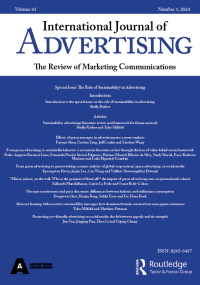Refining replacements. Validating a revised typology of visual metaphor using perceived processing fluency and aesthetic pleasure
IF 5.3
3区 管理学
Q1 BUSINESS
引用次数: 2
Abstract
Abstract A renowned classification of visual metaphor (depicting e.g. TOOTHPASTE IS DIAMOND) is the one by Phillips and McQuarrie differentiating between juxtaposition, fusion and replacement. Replacements are oftentimes treated as one unambiguous construct. We reason that there are three disparate replacement types varying in audience responses because of differences in presence and type of visual context: 1) source without target context (e.g. diamond on neutral background), 2) source in target context (e.g. diamond on toothbrush) and 3) target in source context (e.g. tube of toothpaste on ring). We validated our refinement in an experiment with replacement type as within-subjects factor and perceived processing fluency and aesthetic pleasure as dependent variables. Metaphor comprehension was also taken into account. Participants saw 6 ads (2 per replacement type) for fictitious brands. Overall, perceived processing fluency and aesthetic pleasure were highest for source in target context ads. Source without target context ads and target in source context ads were perceived as equally fluent to process and aesthetically pleasing. For comprehended metaphors, perceived processing fluency was higher for target in source context ads than for source without target context ads. This study shows that Phillips and McQuarrie’s replacement category needs to be refined. Studies comparing replacements with juxtapositions and fusions need to be wary of the crucial role of visual context. Replacements showing the source object in the context of the target (e.g. diamond on toothbrush) outperform the other replacement types.精炼替代品。使用感知加工流畅性和审美快感验证视觉隐喻的修订类型
Phillips和McQuarrie提出了一种著名的视觉隐喻分类方法(如牙膏是钻石),它区分了并置、融合和替换。替换通常被视为一个明确的构造。我们认为,由于存在和视觉背景类型的差异,受众的反应有三种不同的替代类型:1)没有目标背景的源(例如中性背景上的钻石),2)目标背景中的源(例如牙刷上的钻石)和3)源背景中的目标(例如牙膏上的牙膏管)。我们在实验中验证了我们的改进,替换类型作为主体内因素,感知加工流畅性和审美愉悦作为因变量。隐喻理解也被考虑在内。参与者看到了6个虚构品牌的广告(每个替代类型2个)。总体而言,有目标语境的源广告的加工流畅度和审美愉悦度最高。没有目标语境的源广告和有目标语境的源广告在加工流畅度和审美愉悦度上被认为是一样的。对于已理解的隐喻,有源语境广告的目标隐喻的感知加工流畅性高于无源语境广告的目标隐喻。本研究表明,Phillips和McQuarrie的替代类别需要进一步完善。比较替换与并置和融合的研究需要警惕视觉环境的关键作用。在目标环境中显示源对象的替换(例如牙刷上的钻石)优于其他替换类型。
本文章由计算机程序翻译,如有差异,请以英文原文为准。
求助全文
约1分钟内获得全文
求助全文

 求助内容:
求助内容: 应助结果提醒方式:
应助结果提醒方式:


